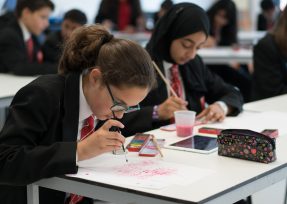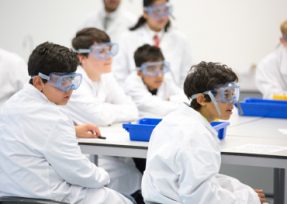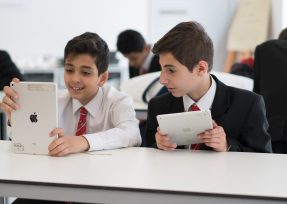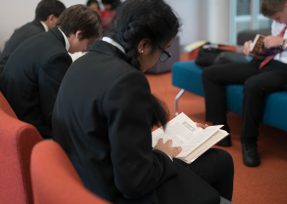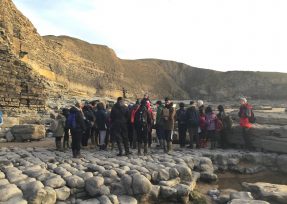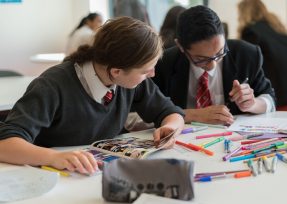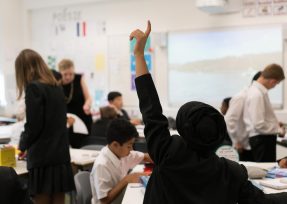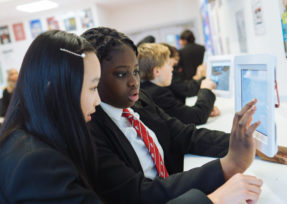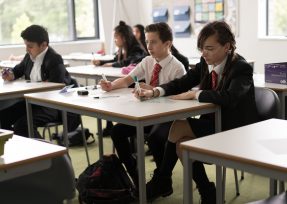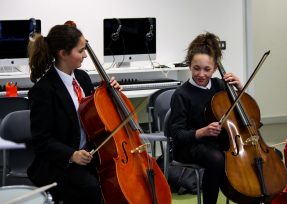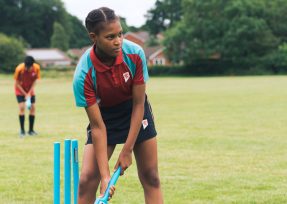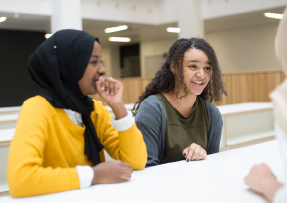English
English
Through engaging with literature, through oracy and through their own writing, pupils develop the confidence to express themselves with clarity and authenticity.
View UoB School English Curriculum Outline.
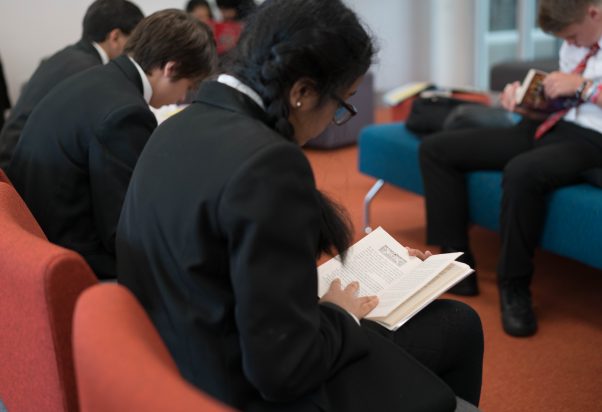
Course Description.
According to the French writer and filmmaker, Jean Cocteau, “A poet is a liar who always tells the truth.” In an age where the online spread of information has created so much uncertainty and ‘fake news’, the moral and human truths explored in English Literature are more vital and relevant than ever. Furthermore, the discipline and skills required to produce focused analysis and a clear argument benefit all study, across the curriculum.
In English at UoB School, our pupils and students are encouraged to evaluate and question language and learn how it can be used to promote or negate any issue. Through engagement with literature, through oracy and through their own writing, our pupils and students develop the confidence to express themselves with clarity and authenticity.
Our aim in Key Stage 3 is to engage and enthral pupils, as well as helping them to tighten their control of critical and written skills. We teach in mixed attainment classes where we intertwine the study of literature with regular and repetitive spelling, punctuation and grammar lessons to encourage technical accuracy and increase vocabulary. We have a primary specialist who teaches those pupils who have fallen behind during Key Stage 2, helping to engage them in reading, building their confidence and supporting their progress throughout Key Stage 3 in the Nurture group. The Nurture group follows a more scaffolded version of the same schemes of learning set for all classes, meaning any pupils who are ready can return to mainstream learning.
In Year 7, we focus upon the roots of literature: oral storytelling. Pupils listen to and discuss oral stories, and then write their own tales, which they tell to each other. This is followed by an exploration of Shakespeare’s world and language through drama. Pupils read and perform extracts from his plays and poetry, exploring genre, metre and form and the world of early modern theatre. We also explore literary non-fiction, learning to analyse a text via the classic autobiography by Gerald Durrell, My Family and other Animals. Finally, pupils hone their inference and deduction skills and learn about a key genre of literature, with a murder mystery module.
In Year 8, we focus upon grammar to improve writing, looking at narrative techniques and devices and writing our own story openings. A unit on conflict follows, which looks at war poetry and non-fiction texts, developing essential analytical skills and helping to develop empathy and compassion. Pupils then read Orwell’s classic, Animal Farm, and write and deliver their own persuasive speeches, engaging them in the power of political rhetoric. Pupils deliver their speeches to each other and vote for their own Supreme Leader of Year 8. Through an exploration of Macbeth, pupils further develop their oracy skills as well as their dramatic skills, literary analysis and creative writing. This is followed by an exploration of non-fiction extracts that enable pupils to hear a range of different voices, cultures and experiences and investigate and then write their own non-fiction account of another person’s personal experiences.
In Year 9, we begin with an anthology of prose texts and a range of poems which are broadly based on the theme of Identity. Texts have been selected from a range of diverse voices and experiences that we hope will be either reflective of our cohort’s experiences or help pupils to empathise with different cultures and perspectives. Pupils learn ‘Still I Rise’ by Maya Angelou, by heart, to develop oracy skills and focus on identifying and analysing writers’ language and structural choices. There is a summative assessment where they explore two prose extracts from the anthology. This is their first full essay response in English. Next, we explore, through fiction extracts, Victorian Villains, focusing upon literary techniques and developing vocabulary and sentence structures in response to them. Pupils then explore and analyse scenes in Shakespeare’s Much Ado About Nothing and are assessed for a paired, dramatic performance of Beatrice and Benedict’s witty repartee. In the final term of year 9, we compare and analyse modern non-fiction texts. Finally, we delve back into poetry, identifying the stylistic devices and form of a poem and then using this as a style model to write our own poetry around cultural identity. This is a marvellous way to close what is intended to be an engaging and stimulating Key Stage 3 curriculum that fully prepares pupils for the next stage of their learning.
In their fortnightly library lessons, pupils are encouraged to read widely in our beautiful school library; reading levels displayed on the texts and access to our librarian (an expert in children’s literature) help them choose reading-age appropriate texts. We also hold an annual Spelling Bee, for which all pupils from Years 7 to 9 are entered, via English lessons. They attempt to spell a range of words, most of which have been selected by subject leaders to help pupils develop their knowledge of key vocabulary across the curriculum. Our champion is awarded a trophy in recognition of their achievement.
In Years 10 and 11, we follow the Edexcel specifications for GCSE; lessons are divided between literature and language and culminate in examinations at the end of year 11. The work completed in Key Stage 3 has prepared our pupils well for their study of Shakespeare’s Romeo and Juliet, Dickens’ A Christmas Carol for Paper 1 and Priestley’s An Inspector Calls and the Belonging Anthology of poetry from Edexcel. Language lessons focus on developing the analytical skills learned in Key Stage 3 and applying them to unseen extracts. Because the fiction paper in Paper 1 is 19th century, we retain our fortnightly library lesson for Year 10, using it to model to pupils how to read and access 19th century extracts, as well as allowing pupils to access the library and sustain the reading habits they acquired in earlier years.
At Key Stage 5, we offer English Literature AQA A level, (Specification B). The course focuses upon genre, meaning all texts in Paper 1 are explored for aspects of tragedy and all texts in Paper 2 are studied for elements of crime. There are also two pieces of work required for the NEA (non-examined assessment, or coursework) where pupils write critical essays in response to their chosen prose text and poet respectively, through a critical lens, via AQA’s Critical Anthology. For this, wider reading and investigation are essential so that students can develop their reading of their chosen texts and consider them in new ways. Students study Shakespeare’s King Lear, Miller’s Death of a Salesman and a selection of Keats from AQA’s Tragedy anthology for Paper 1 and McEwan’s Atonement, Christie’s ‘The Murder of Roger Ackroyd and poems by Crabbe, Browning and Wilde via AQA’s crime anthology, for Paper 2. Wherever possible, we exploit our connections with the academic staff at the University of Birmingham and the RSC to expand and enrich our students’ understanding and appreciation of their set texts.
English is a very popular subject with our students, proven by the exceptional uptake for A level English literature at UoB School.
Key Information
Department
English
Subject Leader
Ms S Astley
Contact
Admissions enquiries
e: admissions@uobschool.org.uk